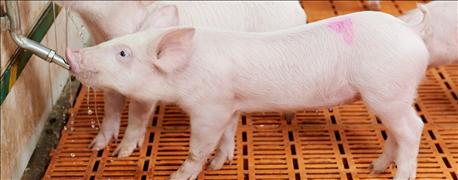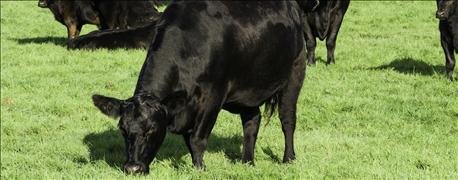
In May, the Humane Society of the United States (HSUS) announced the formation of a National Agriculture Advisory Council, following the establishment of 11 state agriculture advisory councils over the last four years, including a council in Nebraska.

Kevin Fulton says the primary goal of the council is to allow farmers to act as advisors to HSUS leaders. "This is a mutually beneficial arrangement where we advise HSUS leaders and help steer them in the right direction to help traditional family farmers that are using humane and sustainable practices," Fulton says. "We want to see more farmers and more animals on the land. We want to get them back out of factory farms and back on the land."
Kevin Fulton, a Nebraska farmer who has served as chairman of the state council and will serve as chairman of the national council, says the primary goal is to allow farmers to act as advisors to HSUS leaders. "This is a mutually beneficial arrangement where we advise HSUS leaders and help steer them in the right direction to help traditional family farmers that are using humane and sustainable practices," Fulton says. "We want to see more farmers and more animals on the land. We want to get them back out of factory farms and back on the land."
This includes creating policies to help what Fulton calls traditional family farmers. This includes incorporating more animal welfare standards into organic certification, supporting checkoff reform in the beef and pork sectors, supporting Country of Origin Labeling (COOL), opposing "Right to Farm" legislation in states like Nebraska, and supporting legislation to ban packer ownership of livestock. This spring, the Nebraska unicameral passed LB176, overturning a ban on packer ownership in Nebraska – the only remaining state with a ban on packer ownership.

Pete McClymont of the Nebraska Cattlemen says HSUS is working with those that fit its definition of traditional family farmers in an effort to pit one group of producers against another. "We have a membership that represents all sectors of the cattle industry statewide. Our members recognize and use a variety of production practices." McClymont says. "It takes diversity in farming and ranching methods to successfully grow an industry. It is imperative that the differences are respected rather than criticized."
Fulton, who operates a diversified organic crop and grassfed livestock farm, says the goal of HSUS is not to end animal agriculture. "How could HSUS end animal agriculture? The majority of the people in this country are meat-eaters. Even if they wanted to, it would be an impossible task," Fulton says. "There is no effort to eliminate animal agriculture. If [HSUS] were working to end animal agriculture why would they be working with farmers to develop policies to make sure we can stay on the farm?"
~~~PAGE_BREAK_HERE~~~
What HSUS is against, Fulton adds, is what the organization considers inhumane practices. "People try to paint HSUS as being extremists, but that's not the case at all. Ninety-five percent of HSUS members are meat-eaters, but they don't believe in animal cruelty. We feel the extreme is putting a sow in a gestation crate where she can't move," Fulton says. "We are against certain practices, and the opposition doesn't agree with that."
Different perspectives
However, leaders in Nebraska's animal ag sector feel differently. According to Ansley Mick, executive director of We Support Agriculture (WSA), a coalition made up of the Nebraska Cattlemen Association, Nebraska State Dairy Association, Nebraska Farm Bureau Federation, Nebraska Pork Producers Association, and Nebraska Poultry Industries, Inc., the idea that HSUS is working to help family farmers doesn't align with the message the group conveys on a broader level.
"Wayne Pacelle, HSUS president and CEO is a vegan and well-known animal rights activist who has stated previously that he doesn't believe we should raise animals on farms," says Mick. "HSUS's website lists what they call the 3 R's – reduce, refine, and replace, which involves pushing consumers to reduce or replace animal-based diets with plant-based diets."
Pete McClymont, executive vice president for the Nebraska Cattlemen, says HSUS is simply working with those that fit its definition of traditional family farmers in an effort to pit one group of producers against another. "We have a membership that represents all sectors of the cattle industry statewide. Our members recognize and use a variety of production practices." McClymont says. "It takes diversity in farming and ranching methods to successfully grow an industry. It is imperative that the differences are respected rather than criticized."
Contrary to HSUS's claims, Mick notes many of the modern practices used on today's farms were adopted with animal welfare in mind. "For example, gestation crates were adopted to make animals more comfortable, prevent fighting between sows, and increase survivability," she says. "They are used on farms of all sizes, and have increased efficiency, which allows smaller operators to compete."
~~~PAGE_BREAK_HERE~~~
With programs like Beef Quality Assurance (BQA) and Pork Quality Assurance (PQA), Al Juhnke, executive director of the Nebraska Pork Producers Association notes producers and processors alike are already making strides in raising livestock in a humane way.
"Kudos to all the processors in this state. They require those programs in order to market our product and make sure the public understands their product is grown in a humane and sustainable way," Juhnke says. "Animal welfare has only gotten better. Survivability of animals is quite high right now, especially in Nebraska. Our litter numbers tend to be higher than the national average. Nebraska is a national leader in pig survivability, and I'm proud of that."
About the Author(s)
You May Also Like






